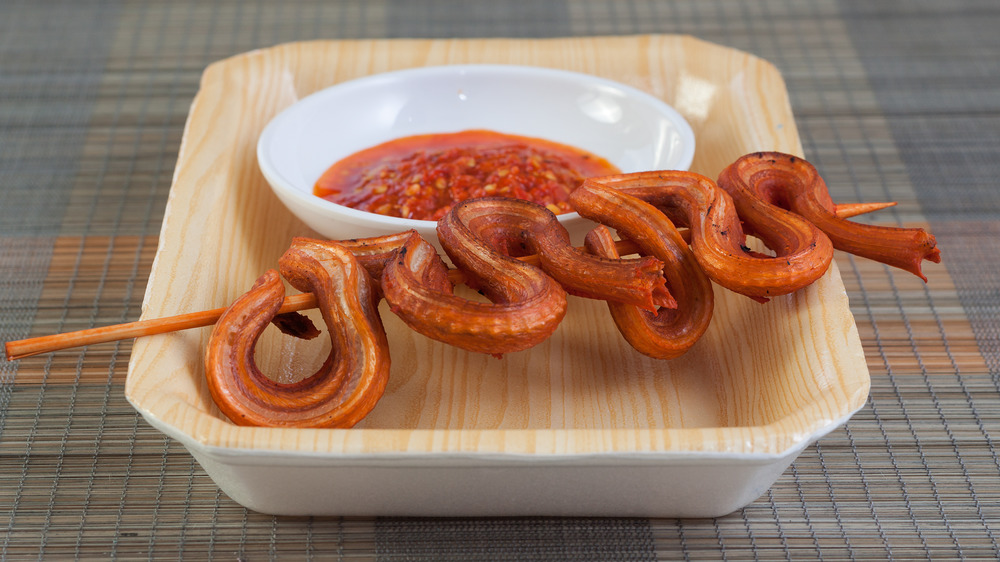The Real Reason Florida Officials Are Asking Residents To Eat More Snakes
Have you ever eaten snake meat? Would you even consider it? While snake isn't the kind of thing you typically find on most restaurant menus, it is popular in other parts of the world. It's a prevalent cuisine in Asian countries where snakes are credited with having medicinal properties, according to FitDay. Reportedly, Kim Jong-Un also likes to drink them in wine. You may also, should you stumble upon just the right hole-in-the-wall cafe or be invited to someone's home in Texas or Arizona, have the opportunity to sample bizarre foods like rattlesnake chili, plus there's always a chance you could find deep fried snake on a stick sold at state fairs. (Why not? They sell every other kind of food under the sun there.)
FitDay reports there doesn't seem to be much scientific evidence backing up claims for its curative and restorative powers, however, snake meat is very high in protein and has about half the calories and one-third the fat of sirloin steak. So are you sold on snakes yet? The Florida Fish and Wildlife Conservation Commission certainly hopes so. According to the Tampa Bay Times, Florida officials are hoping that adventurous eaters will save the state from a veritable plague of pythons.
Eating snakes is one way to get rid of them
In Florida, Burmese pythons are considered to be an invasive species since many pet owners release their scaly companions into the wild once the novelty of snake stewardship wears off, per Smithsonian Magazine. It just so happens that these former pets, like so many other retirees, thrive in Florida's tropical climate. While these reptiles might be no big deal in a state whose residents are used to dealing with alligators on a daily basis, still, the snakes are disrupting the food chain and destabilizing the ecosystem. Not to mention, having snakes slithering from the rooftops is just plain creepy even if it isn't particularly dangerous. (The operative word being "particularly", since the U.S. Geological Survey has said that they "cannot categorically rule out the possibility of a fatal [python] attack", although apparently no deaths resulting from wild pythons have been documented to date.)
Carli Segelson, a spokesperson for the Florida Fish and Wildlife Conservation Commission, told the Tampa Bay Times: "We would like to use consumption as another way to encourage people to remove pythons in Florida if the meat is safe to eat." Any safety concerns result not from poison (pythons are non-venomous) but from the possibility that snake meat is high in mercury, although the state is currently studying this to determine whether mercury levels are low enough to make snake meat safe for human consumption.
So does it really taste like chicken?
Snake hunter Donna Kalil — yes, it's a real job, she works for the South Florida Water Management District — told the Tampa Bay Times that she's eaten a dozen or more pythons over the past few years. She describes the flavor by saying "it definitely does not taste anything like fish, it tastes more like chicken," but goes on to say it's maybe "more like a pork chop."
She likes to use python meat to make jerky and in chili and stir fries, but one of her favorite dishes is python pasta: cook the meat in a pressure cooker with onion and garlic, then add it to spaghetti sauce. (Talk about your secret ingredients!) But why use a pressure cooker? If snake meat isn't cooked properly, it can be tough and rubbery, but the pressure cooker helps to tenderize it. Kalil does say her husband won't touch the stuff, though, and admits that snake meat isn't so much an acquired taste as "an acquired thought process." Well, if a trip to Florida is in your future, you might want to try wrapping your brain around the concept now. If Florida officials have their way, barbecued python could become as well-established a regional specialty as conch chowder and key lime pie.


